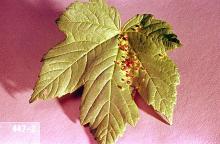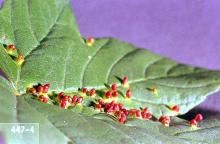Vasates quadripedes
Pest description and crop damage The maple bladdergall mite is a tiny eriophyid mite that feeds on the underside of leaves. Infested leaves initially develop small depressions which soon grow into brilliant red galls 0.125 to 0.25 inch in length. Later in the season, the galls may turn green or black. Silver and red maples are particularly susceptible to bladdergall mites. Severe infestations may cause leaves to become somewhat distorted. Although an aesthetic concern, bladdergalls are seldom harmful to the trees.
Biology and life history The mites overwinter in cracks and under bark scale and begin feeding in spring. Mite activity typically stops by around July.
Management-cultural control
Hand-pick severely infested or distorted leaves to improve appearance of small trees.
Management-chemical control
Spray in early spring before buds open
Management-chemical control
See:
Chemical Control of Nursery Pests
Spray in early spring before buds open.
For more information
Johnson, W.T. and H.H. Lyon (1991), Insects That Feed on Trees and Shrubs, 2nd ed., Cornell University Press (p. 482).
PNW Nursery IPM: Maple bladder gall mite (http://oregonstate.edu/dept/nurspest/maple_bladder_gall_mite.htm)


